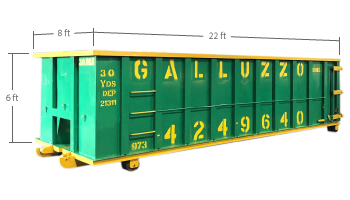Optimizing your dumpster rental experience includes greater than simply selecting a dumpster dimension. It requires careful consideration of a number of variables, including the rental period, dumpster kind, and neighborhood policies. Exact waste volume estimation and correct positioning of the dumpster are important to ensuring efficient waste management and price savings. In addition, comprehending weight capacity, local ordinances, and purposefully intending pick-up and delivery timetables can assist decrease obese penalties and project delays. By mastering these crucial parts, you can streamline your waste monitoring process and uncover much more ways to maximize your dumpster rental experience.
Determining the Right Dumpster Size
When dealing with a task that requires waste removal, among one of the most critical choices lies in establishing the best dumpster size A dumpster that is also small can cause expensive overflows and additional fees, while one that is also huge can cause unnecessary expenses and thrown away space.
In order to stay clear of these problems, it's vital to properly approximate the volume of waste your project will certainly generate.

Factors to take into consideration when picking a dumpster size include the kind and amount of products being disposed of, the availability of space on-site, and any kind of local regulations or restrictions.
Typically, dumpsters vary in dimension from 10 to 40 cubic yards, with one of the most usual dimensions being 20 and 30 cubic yards.
It's likewise vital to evaluate the weight capacity of the dumpster, as surpassing the recommended weight can lead to additional charges or even damage to the dumpster.
Choosing the most effective Rental Period
Once the optimal dumpster size has actually been identified, focus can move to choosing the very best rental duration, an essential aspect of the dumpster rental process that can considerably influence job costs and efficiency.
The rental duration ought to be meticulously thought about to ensure that the dumpster is on-site for the required quantity of time, without incurring unneeded costs.
When choosing the most effective rental period, consider the following variables:
Project timeline: How much time will the job take to complete? Make sure to make up any type of potential hold-ups or setbacks.
Debris generation rate: Exactly how swiftly will lose be created throughout the project? A much faster generation rate might require a shorter rental period.
Dumpster capacity: Just how typically will the dumpster need to be cleared? A larger dumpster may call for a much longer rental period.
Budget constraints: What is the allocate the rental duration? A longer rental duration might be more cost-effective in the long run.
Selecting the Ideal Dumpster Type
The size of the dumpster is additionally essential. A smaller dumpster might be excellent for smaller sized jobs or those with limited space, while bigger dumpsters are much better fit for big projects that produce a considerable amount of waste.
Additionally, take into consideration the dumpster's product and weight capacity Some dumpsters are created for heavy materials like concrete or asphalt, while others are much better matched for lighter materials like drywall or flooring.
Understanding Regional Regulations
Local ordinances and laws can significantly influence the dumpster rental process, making it essential to comprehend the guidelines controling garbage disposal in your area.
Failure to abide by neighborhood laws can lead to fines, penalties, and even https://www.storeboard.com/blogs/automotive/7-important-actions-for-dumpster-rental-and-garbage-disposal/6056273 job delays. It's essential to study and acquaint yourself with the particular regulations in your area prior to leasing a dumpster.
Some vital regulations to take into consideration include:
Permit requirements: Figure out if you require a license to position a dumpster on your property or street.
Waste acceptance: Discover what kinds of products are accepted in the dumpster and what materials are prohibited.
Dumpster placement: Recognize the rules for putting a dumpster on your residential or commercial property, consisting of constraints on dimension, place, and duration.
Noise restrictions: Be aware of noise laws and restrictions on dumpster shipment and pickup times.
Calculating Your Waste Volume
How much waste will your task generate? Computing your waste volume is a necessary step in maximizing your dumpster rental experience This procedure helps you figure out the right dumpster size, decreasing the risk of overpaying for unnecessary capacity or, even worse, running out of area mid-project.
To quote your waste volume, think about the type and quantity of materials you'll be taking care of. For construction projects, calculate the square video footage of the area being refurbished or destroyed, and increase it by the expected waste generation rate (usually 1-2 cubic lawns per 1,000 square feet).
For household cleanouts or special occasions, tally up the number of things being disposed of, such as furniture, appliances, or trash bags. Be sure to account for bulky items, like couches or fridges, which use up a lot more area than their weight would certainly suggest.
Then, talk to your dumpster rental carrier to determine the excellent dumpster dimension based on your estimations. By accurately computing your waste volume, you'll ensure a smooth and effective waste administration process
Strategically Placing Your Dumpster
Ideal dumpster positioning is important to ensure a smooth waste administration procedure. A well-placed dumpster not only assures very easy gain access to for garbage disposal however likewise stops prospective risks and liabilities.
When identifying the excellent location for your dumpster, take into consideration the list below factors:
Accessibility: Put the dumpster in a location that is conveniently accessible for employees, lorries, and pedestrians to reduce traffic jam and accidents.
Visibility: Setting the dumpster in a visible place to urge responsible waste disposal and protect against prohibited dumping.
Proximity to waste generation: Position the dumpster near to the location where waste is generated to decrease transportation ranges and labor costs.
Compliance with regulations: Verify the dumpster is positioned in compliance with neighborhood policies and statutes, staying clear of penalties and penalties.
Minimizing Obese Fines
Proper dumpster positioning sets the stage for a successful waste management process, and it's just as vital to identify the dumpster is not overloaded, as this can cause expensive obese fines.
Overloading can take place when the weight of the waste exceeds the dumpster's maximum capacity To avoid this, it's crucial to approximate the weight of the waste properly and pick the best dumpster dimension for your project.

Additionally, it's essential to distribute the weight equally within the dumpster to avoid moving during transportation.
Another method to reduce obese penalties is to separate hefty materials like concrete, brick, or asphalt from lighter waste. By doing so, you can protect against overloading and facilitate a smoother disposal process.
Moreover, it's advised to maintain a record of the waste disposal process, including weight tickets and disposal invoices, to confirm conformity with laws in instance of an audit.
Streamlining Pickup and Delivery
Scheduling dumpster pick-ups and shipments effectively is crucial to maintaining a smooth waste administration procedure. By improving these logistics, you can assure that your job stays on track and stays clear of costly delays.
When coordinating with your dumpster rental provider, it's important to offer exact details regarding your job's timeline and waste generation rates.
To guarantee a smooth pick-up and distribution process, keep the adhering to ideas in mind:
Specify exact delivery and pickup dates to avoid complication and miscommunication. Designate a clear drop-off location to assure simple gain access to for the delivery driver. Provide exact quotes of waste volume to stop overloading or underloading the dumpster. Confirm the rental duration and extensions to avoid unexpected charges or penalties.